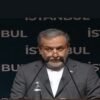Web Desk: A number of Latin American countries have voiced strong opposition to the recent US air strikes on Iranian nuclear facilities, condemning what they describe as a dangerous escalation and a breach of international law.
Several leaders and foreign ministries across the region called for restraint, urging a return to diplomacy to prevent further destabilisation in the Middle East.
Cuban President Miguel Díaz-Canel, in a post on social media platform X , denounced the strikes as a “grave violation” of international norms.
Condenamos enérgicamente bombardeos de EEUU contra instalaciones nucleares de Irán que constituyen peligrosa escalada de conflicto en Oriente Medio.
— Miguel Díaz-Canel Bermúdez (@DiazCanelB) June 22, 2025
Agresión viola gravemente Carta ONU y Derecho Internacional y arrastra a la humanidad a una crisis de irreversibles consecuencias.
“We strongly condemn the US bombing of Iran’s nuclear facilities, which constitutes a dangerous escalation of the conflict in the Middle East,” he wrote. “This aggression gravely violates the UN Charter and international law and plunges humanity into a crisis with irreversible consequences.”
Chilean President Gabriel Boric echoed the concern, stating simply: “We demand and need peace.”
Estados Unidos anuncia que acaba de bombardear centrales nucleares en Irán. Atacar centrales nucleares está prohibido por el derecho internacional. Chile condena este ataque de EEUU.
— Gabriel Boric Font (@GabrielBoric) June 22, 2025
Defenderemos el respeto al derecho internacional humanitario en todas las instancias. Tener…
Venezuela’s Foreign Affairs Ministry issued a statement condemning what it termed “military aggression against Iran,” while reaffirming its solidarity with Tehran.
Colombia and Mexico adopted a more measured tone, appealing for dialogue to resolve the crisis. Colombia’s foreign ministry stressed that negotiations remained “the only responsible and lasting way out of the current crisis.” Mexico, in a post on X, called for the “restoration of peaceful coexistence” among regional states, highlighting diplomacy as the “highest priority.”



